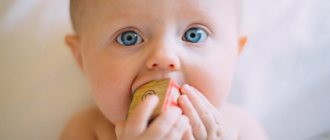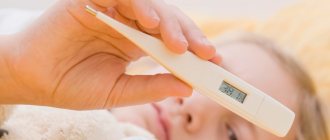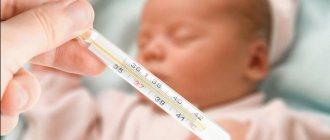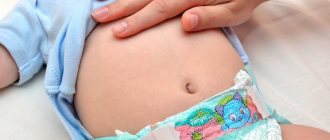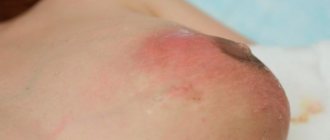Hypersalivation, its types and methods of treatment
Some people experience increased salivation.
In medicine, this action is called hypersalivation. Hypersalivation – increased secretion of the salivary glands. If it manifests itself in an adult, hypersalivation is considered a disease. Often, the cause of hypersalivation may not be an increase in the secretion of the salivary glands, but a violation of the swallowing reflex.
In a healthy person, the normal level of salivation is 2 mg in any 10 minutes. Although if a person is in a painful state or his condition changes, then salivation can either increase or decrease.
At 1 month
The swallowing reflex in a newborn is not yet fully developed, but the active work of the salivary glands stimulates the production of saliva. At 1 month old, the baby has not yet learned to swallow, although the young mother notices his swallowing reflex when breastfeeding.
Not understanding what he should do with the saliva in his mouth if he is already full, the logical action for him would be to release the saliva outward - and it seems to his parents that it is flowing in a stream down his chin. Mom and dad must ensure that the baby does not choke on saliva while lying on his back - it is best to place him on his side. Also make sure that the baby's chin remains dry, if possible.
When to see a doctor
It is not always safe for a baby to drool and bubble at 2 months. Often the appearance of such a symptom can mean the onset of a serious illness.
If you notice the following signs, you should immediately consult a doctor:
- The mucous membrane of the oral cavity is inflamed. If ulcers, wounds and erosions are visible on the tongue, then you should immediately begin qualified treatment.
- The sockets on the gums become inflamed during teething.
- Helminthic infestations. Helminths release toxic substances and waste products into the body, which causes saliva production to increase.
- Inflammatory processes of the ENT organs: otitis, sinusitis.
- Poisoning with toxic substances: mercury, lead, chemical pesticides.
- Traumatic injuries increase the secretion of the salivary glands and disrupt their activity.
- Infectious diseases. In this case, hypersalivation is auxiliary in nature, thus the body gets rid of pathogenic microorganisms. Often the temperature also rises, a runny nose, cough, and redness in the throat appear.
- Conjunctivitis.
- Streptococcal sore throat.
- Epiglottitis is swelling of the epiglottis. An ambulance must be called.
- Cramps.
For hypersalivation, anticholinergic drugs are prescribed:
- Atropine;
- Spasmolitin;
- Tifen;
- Diprofen.
Important! All medications should be taken with caution. If the remedy is chosen incorrectly, it will cause hypersalivation and more serious consequences. If surgery or radiation is required, you should be aware that this can lead to deviations in the form of caries and facial asymmetry
All decisions regarding treatment are always made thoughtfully, the most appropriate method is selected based on the individual characteristics of the child and feasibility
If surgery or radiation is required, you should be aware that this can lead to deviations in the form of caries and facial asymmetry. All decisions regarding treatment are always made thoughtfully, and the most appropriate method is selected based on the individual characteristics of the child and feasibility.
In some cases, treatment requires speech therapy massage, since hypersalivation makes it difficult to pronounce sounds.
If the cause of salivation is physiological, then it does not require medical intervention and goes away on its own after some time. In the case of pathology, the underlying disease, which was the result of hypersalivation, should be identified and a course of treatment carried out.
How to help your baby during periods of excessive salivation?
Parents will have to come to terms with and go through the period of slobbering toddler. It is unpleasant for the baby to be slobbery, so parents take special care and care for the baby at this time.
Sometimes a baby drools so much when lying down that he chokes and simply choke on it. He may experience a cough, even wheezing. To prevent your child from getting into trouble, place him on his side or tummy, or you can put him on a low pillow. So, the drool will flow down and will not harm the baby.
Soon the time for teething comes, the baby's gums itch and itch, he constantly chews something to relieve the itching. Help him, massage his gums with your finger. And in the places where the first teeth appear, press lightly. On the doctor's recommendation, buy a special product and lightly lubricate the gums with it, this will calm the baby.
A pacifier will help minimize the problem of drooling. If a baby sucks on a pacifier, he will swallow saliva
Do not neglect the invention of our grandmothers - the bib. It is lined with waterproof material that will protect the chest from constant moisture. It’s better to stock up on bibs before your baby is born, so that you always have them at hand. Despite the fact that in recent years there has been an active campaign against the use of pacifiers, a pacifier can be very helpful because it makes it easier for a child to swallow drool. Buy your baby a soft teething toy. It will not only help reduce itching of the gums, but will also absorb excess saliva. Don't forget to wash it regularly and rinse it well. Irritations from drooling on the baby's chin need to be lubricated with nourishing creams containing vitamins A and E. If the baby catches a cold and develops a runny nose, the matter will become more complicated. The baby will not be able to breathe through his nose, but it will also be problematic to do this with his mouth, since it is full of drool
It is important to treat a runny nose to avoid such complications. A small newborn baby spends more time lying on his back, making it difficult for drool to come out of his mouth.
Place your baby on his tummy more often and you will immediately notice how much more fun he will become, forgetting about his problem. To relieve itching in your child's gums, use cooling and anesthetic gels. The weaker the irritation, the less saliva will be released.
Although increased salivation in a baby brings some troubles, in most cases it is an absolutely natural process and all children go through it. It will last up to approximately 18 months. Therefore, reconcile yourself and simply provide the baby with care and concern. You will not even notice how the child will outgrow this period and learn to control his salivation.
First of all, you need to make sure that excessive salivation is not a sign of serious illness. To do this, contact your pediatrician. The pediatrician will examine the baby and, if necessary, prescribe laboratory tests or refer you to specialists to find out why the baby is drooling.
If increased secretion of the salivary glands in the first year of life is associated with preparation for the growth of teeth or is simply a physiological age norm, then you can only structure your care for the child in such a way that excessive salivation does not cause him discomfort.
- Put waterproof bibs on your baby to protect his clothes from getting wet and the skin underneath from hypothermia;
- the process of swallowing saliva can become more effective if the newborn sucks a pacifier;
- If the skin becomes irritated because the baby is drooling, lubricate the inflamed areas with Bepanten ointment or baby creams. containing retinol and vitamins F and E;
- if the baby starts coughing or vomits because drool flows down the walls of the larynx, try to lay him on his tummy more often, and turn him on his side to sleep;
- to reduce salivation in a two- or three-month-old baby associated with teething, give the baby special massagers-teethers, with which he can soothe the itching, and lubricate the gums with cooling pain-relieving gels;
- if the baby constantly puts everything in his mouth, surround him only with clean objects that have been properly processed; Such measures will help reduce excessive salivation.
When should you contact specialists?
Typically, a dysarthric child sees a speech therapist at 4-5 years of age. This is quite late, but with proper correction and regular classes, the violation can be minimized by the time he enters first grade. The sooner you contact specialists, the higher the chances of success.
A simple test will help determine whether a child has problems with the mobility of the speech apparatus. Stand in front of the mirror, complete the tasks yourself first, then ask your child to repeat them:
- smile, and then stretch out your lips. Only the lips work, the teeth are closed, the chin does not move;
- stick out your tongue and then remove it;
- open your mouth slightly and spread your tongue on your lower lip, hold it in this position for 5 seconds;
- open and close your mouth wide, slapping your lips;
- open and close your mouth, make a tube with your lips, repeat several times;
- open your mouth, touch the corners of your mouth with the tip, move your tongue back and forth, imitating the pendulum of a clock.
Keep in mind that any conclusions can be drawn only after the child has made several unsuccessful attempts, because the first time he may not understand what is required of him. The following signs are reasons to contact a neurologist or speech therapist:
- the child cannot immediately find the right position for the speech organs;
- has difficulty holding them in a given position;
- the smile and protruding tongue seem to move to the side;
- he cannot perform individual movements;
- involuntary synchronous movements of the speech organs.
Dysarthria is also indicated by undeveloped fine motor skills, awkwardness, difficulty maintaining balance, excessive tension or relaxation of the muscles of the face and neck, and nasal pronunciation. If you notice at least two or three of the listed signs, immediately show your baby to a speech therapist and neurologist.
Treatment methods
If the problem causing hypersalivation is pathological in nature, then treatment must be carried out to prevent exacerbation.
Folk remedies
Folk remedies should be a complement to medication methods. Young children can benefit from rinsing the mouth with decoctions of the following herbs:
- nettle infusion;
- sage tea;
- cabbage pickle
Your local pediatrician should choose the weed. You can also use infusions by adding them to a bath with warm water. Tinctures of nettle, black elderberry, calendula, St. John's wort or chamomile are suitable here.
Yes, there are traditional methods of dealing with these manifestations. They are especially effective if the cause of hypersalivation is problems with the oral cavity.
You can rinse your mouth with a decoction of chamomile or nettle. But this method should not be used as the main one. It is more of an adjuvant therapy that complements drug treatment. Rinsing your mouth with herbs will not cope with serious problems.
Also, do not forget that the use of folk remedies must be agreed with the attending physician. Many herbs are highly allergenic, so they are prohibited for children.
Medicines
Therapy is carried out in two directions:
- Treatment of the underlying pathology, which provoked strong salivation.
- Relieving the condition of the baby by reducing the pain effect.
If a month-old baby or an older baby is drooling, then medications are prescribed that reduce the functions of the salivary glands.
Saliva is a baby’s indispensable assistant in the fight against bacteria and viruses.
However, they are prescribed in critical situations
, for example, if a newborn chokes at night, which can be fatal.
The solution to the problem itself depends on the cause of its occurrence. In cases of colds and stomatitis, therapy will be prescribed by a pediatrician and dentist.
Basic treatments at home
At home, to alleviate the condition of the baby, you can do the following:
- Applying pieces of ice to the contour of the lips. In the case of a newborn, the ice should be wrapped in a cloth.
- Rinsing the mouth with herbs.
- Children 9-12 months old can have massage and exercises.
- Introducing solid foods into your diet will help develop your swallowing reflex. If the baby is too small, a nibbler can be used.
How to get rid of this?
First of all, you need to determine the causes of excessive salivation. If it is pathological, then you cannot do without the help of a doctor and drug treatment.
If increased salivation is a physiological process, then parents need to alleviate the baby’s condition and support him during the period of hypersalivation:
- The restoration of the baby’s health depends on quick and adequate treatment.
When pathological changes occur in the oral mucosa in a child, it is necessary to consult a specialist. The restoration of the baby’s health depends on quick and adequate treatment.
To get rid of hypersalivation, the cause of which is stomatitis or gingivitis, dentists prescribe medications that destroy infectious agents and promote rapid regeneration.
If there is a helminthic infestation or a somatic disease, the symptom of which is increased secretion of the salivary glands, the child should be taken to see a doctor, thoroughly examined and treated with medications that normalize salivation.
Natural remedies will help improve the condition of the little patient. For stomatitis, it is recommended to rinse the mouth with table salt solution or herbal infusions, and for gingivitis - with sea buckthorn oil.
You can reduce the secretion of saliva by strengthening the immune forces of the child’s body. For this purpose, they protect children from emotional stress, often take them for walks on the street, give them healthy food enriched with vitamins, and develop them physically by participating in various sports sections.
Always use a bib. Treat the skin of the face with nourishing creams, and if necessary, dry the skin on the chin with the addition of zinc.
Using pacifiers will help the baby reflexively swallow saliva when it is released in abundance.
Important! Self-medication of hypersalivation in children is strictly prohibited. Only the help of a qualified specialist will help to correctly establish the etiology of the pathology, on the basis of which appropriate treatment will be prescribed.
Pathological causes
Causes of pathological salivation in a 2-3 month old baby:
- Stomatitis is an inflammatory disease of the oral cavity, characterized by the formation of ulcers and aphthae on the mucous membrane. With the help of saliva, the body tries to neutralize the infection; it is released as a reaction to infection. Also, the amount of salivary fluid increases due to the pain experienced by the baby
- Candidiasis is a fungal infection caused by fungi of the genus Candida. A common occurrence in newborns who become infected with thrush from the mother during the birth canal or from dirty nipples and bottles. It manifests itself in the appearance of a white cheesy coating on the tongue, under which bleeding ulcers are hidden. Saliva from thrush is thick, cloudy, and smells unpleasant.
- Cerebral palsy and other disorders of the central nervous system. The child experiences partial muscle paralysis, convulsions, and impaired coordination of muscle movements. Such disorders prevent children from retaining saliva in their mouths.
- Colds, ARVI, respiratory diseases (bronchitis, pneumonia, sore throat). With these ailments, in addition to hypersalivation, the child develops a cough, runny nose, and fever.
- Diseases of the digestive system. Pathologies in the functioning of the stomach and intestines can provoke increased salivation. The saliva will smell unpleasant and have a thicker consistency.
Changes in the amount and composition of saliva can occur due to stressful situations and nervous tension. Only a doctor can find out the reason that caused hypersalivation. First of all, it is necessary to take the baby to a pediatrician, and he will refer you to other specialists, if necessary: an endocrinologist, neurologist, dentist or gastroenterologist.
We invite you to familiarize yourself with Papilloma in a child’s mouth photo
Dangerous symptom?
Increased salivation in a child can be a sign of a dangerous disease, which is important to quickly pay attention to and provide assistance to the baby. Strong salivation in a toddler older than 4 months is a possible sign of the following disorders:
- Viral or bacterial infection. Secondary symptoms include nasal congestion and difficulty breathing.
- Congenital abnormality of the swallowing reflex or pseudobulbar syndrome - dysfunction of the muscles of the pharynx or tongue, which leads to the accumulation and involuntary leakage of mucus.
- Allergic rhinitis. Sometimes drooling is the body’s reaction to an allergen (dust, flowering plants, animals).
- Neurological pathologies. If a toddler has symptoms of brain diseases, cerebral palsy, or genetic abnormalities, drooling is also possible.
- Diseases of the gastrointestinal tract. Side effect of pancreatitis or duodenal ulcer in newborns.
- Poisoning. If poisonous substances enter the baby’s body (by airborne droplets or through the mouth), this will cause intoxication. Saliva with bubbles often accompanies this disease.
- Diseases of the endocrine system, hormonal imbalance.
- Stomatitis or candidiasis. In addition to the fact that the baby is drooling heavily, there is a white coating on the tongue and gums and bad breath.
There is an opinion that excessive salivation is a sign of parasites (helminths) in the intestines. It is worth noting that this symptom is not found in textbooks for pediatricians among the signs of worm infection. If a 2,3 or 4 month old baby is infected with parasites, other symptoms are observed: itching in the anus (with helminthiasis), loss of weight and appetite, weight loss (with ascariasis).
Pathologies of the central nervous system, stress, and overexcitation can provoke excessive salivation.
With hypersalivation, it is important to establish the source and cause of the problem. Only comprehensive treatment of the disease will help cope with individual symptoms, including excessive salivation.
Hormonal changes and diseases of the endocrine system
At 11-12 years old, increased salivation at night is associated with hormonal changes. Sweating also increases, and skin problems begin.
We suggest you familiarize yourself with Bad Breath
But the neuroendocrine system can respond with increased saliva production not only to natural changes in hormonal levels. So it occurs in diseases of the thyroid gland, pituitary gland or hypothalamus. In rare cases, hypersalivation develops in diabetes mellitus.
Causes of hypersalivation
Before speculating, you need to find out for sure whether the child’s salivary glands really work in an “intensified mode” and produce more secretions than expected. It often happens that there is no violation of the secretory function of the salivary glands at all, and the normally produced saliva flows randomly from the child’s mouth only because the child does not swallow it for some reason. In this case, they talk about false hypersalivation. In other cases, the violation can be recognized by the daily amount of secretion produced, which should not exceed the norm of 2.5 (!!!) liters.
Nevertheless, let's take a closer look. So, among the reasons for increased salivation are the following:
Usually, in children under six months of age, attention should not be focused on this phenomenon, since any specialist in the vast majority of cases will say that this is normal. Drooling (ptialism) occurs at the level of unconditioned reflexes and soon disappears; Often characterized by a similar symptom, and it can occur long before the tip of the tooth appears above the gum
The soft tissues of the gums are injured, the child may feel itching, express anxiety, and try to “scratch” the gums with improvised objects. In response to irritation, the secretory function of the salivary glands also increases;
It is often characterized by a similar symptom, and it can occur long before the tip of the tooth appears above the gum. The soft tissues of the gums are injured, the child may feel itching, express anxiety, and try to “scratch” the gums with improvised objects. In response to irritation, the secretory function of the salivary glands also increases;
A violation of the act of swallowing may be a consequence of swelling of the nasopharyngeal mucosa; the child constantly breathes through his mouth, which is constantly open. This condition may be the cause of ptyalism;
Drooling leaking out is often the reason that a child has difficulty swallowing (or simply forgets to swallow) or has some anatomical problem, such as an incorrect bite;
The body's natural defense mechanisms are activated in the presence of pathogenic microorganisms in the oral cavity, nasopharynx and middle ear area. This is how the baby’s body fights bacteria, literally washing them away with saliva, which also has a weak antiseptic effect;
In most cases, diseases of the digestive system are accompanied by this symptom;
If the functioning of the central nervous system is disrupted, increased salivation may be observed as a symptom, the causes of which lie in a brain tumor, cerebral palsy and other congenital or acquired diseases;
Often characterized by nighttime drooling;
It may be the root cause of such a symptom. In this case, drooling is accompanied by a number of other signs; When taking lithium-containing drugs, ptyalism is noted as a side effect.
{advertisement2}
Reasons why babies drool
An adult who is drooling arouses vague suspicion among others.
But a baby and drool are such inseparable concepts that they even came up with a special accessory called a “bib.”
Although they say that excessive drooling in a child means teeth will appear soon, there may be other reasons. Knowing the reasons why a baby drools is important in order not to miss serious diseases.
Why do we need drool?
The natural secretion of the salivary glands, which we call saliva, is vital for every living creature.
It protects the oral mucosa from drying out, helps dissolve food, plays an important role in swallowing, fights inflammation in the oral cavity, and helps in speech formation.
This cloudy, light-colored liquid contains enzymes that help prepare food for digestion in the stomach, as well as protect tooth enamel from acids and alkalis in foods. Our sense of taste is also heavily influenced by saliva.
Interestingly, on average, each person produces about 360 liters of saliva per year, or about a liter per day.
When a person eats or even just looks at something appetizing, his mouth reflexively begins to water. And, conversely, much less saliva is secreted during sleep, fear or other stress, and also during general dehydration.
Features of the baby
Usually drooling does not interfere with our life, communication, or rest. We simply don’t notice that they are there, except when we are very hungry. Then they say “I’m about to choke on my saliva.” But in a newly born child, excessive drooling is noticeable and causes some inconvenience. Why is this happening?
There are several reasons, as already mentioned:
- Teeth. This is the most common explanation for excessive secretion of the salivary glands. The baby does not control the process; saliva secretes itself in response to inflammation and increased irritation of the gums.
- Imperfection of development. Since the child is still very small, his body is still developing its basic functions, including salivation. In addition, the baby still does not really know how to swallow, because of this there is a feeling that he is always slobbering, like a Shar Pei.
- Food processing. Although the baby's main nutrition is breast milk, it also needs to be broken down. Milk contains proteins and carbohydrates, the digestion of which requires enzymes contained in saliva. This may cause the baby to feel like they are drooling too much.
- Neutralization of bacteria. Babies aged 1 month and older are already beginning to put anything in their mouths, including non-sterile objects. In this way, a lot of bacteria, both ordinary and pathogenic, enter the mouth. Sometimes ulcers form, that is, stomatitis. Saliva is needed for their healing.
- Hypersalivation. Increased salivation in children, which is not associated with age and is a sign of serious disorders in the brain, central nervous system pathologies, psychopathy and even tumors. In this case, drooling will flow constantly, and you will understand that this is no longer a completely normal process.
If you are worried about your child's excessive drooling, it is better to show him to a pediatrician. This will help you either calm down or find out what the child is sick with, why he is drooling and what treatment is needed. Most likely, your child's excessive drooling is due to the fact that he is at such an age stage.
Excessive salivation during sleep
Often in children, saliva secretion increases at night.
The most common such pathological conditions are:
If you find damp spots on your child's pillow, you should immediately undergo a consultation with a pediatrician.
Worm infestation.
Colds. Dysfunction of the nervous system. Psycho-emotional stress. Stressful state. Teething.
If you find damp spots on your child's pillow, you should immediately undergo a consultation with your pediatrician.
This sign cannot be ignored, since hypersalivation is often a symptom of many serious pathologies.
At first glance, increased salivation in a child may seem like a minor problem that will go away on its own over time. But this is far from a wrong opinion.
Physiological hypersalivation certainly exists, but the pathological form of this pathology does not sleep. Therefore, you should not risk the child’s health, and if the slightest signs appear, you should go to the doctor.
https://kpoxa.info/zdorovie-pitanie/tekut-slyuni-rebenka-2-mes.htmlhttps://pomoshroditelyam.ru/ot-rozhdeniya-do-trekh-let/pochemu-u-trehmesyachnogo-rebenka-tekut- slyuni.htmlhttps://dentoland.com/kids/obilnoe-slyunootdelenie-u-rebenka.html
Excessive salivation as a symptom of disease
The table below lists the possible reasons why a child at the appropriate age may drool profusely in addition to other symptoms. It also describes the measures that can be taken to somehow alleviate his condition:
| What worries the child? | Probable Causes | Your actions |
| In the first six months of life, the baby became irritable, constantly strives to gnaw or chew something, and puts any objects in his mouth. | The process of teething | A pacifier, special rubber rings, or just a cold object can help calm your baby. |
| The baby has a headache, a sore throat, a stuffy nose, snot flowing, he is sneezing, coughing, his temperature has risen, and the lymph nodes in his neck may have enlarged (we recommend reading: why does a newborn sneeze and how to treat it?) | ARVI or sore throat, sometimes streptococcal | Call a doctor and reduce the temperature with paracetamol in the required dose |
| Painful ulcers or white spots appear on the oral mucosa | Stomatitis | Examination by a pediatrician and prescribing appropriate treatment. At home, you can rinse your mouth with a baking soda solution. |
| In a sitting position, the baby takes deep breaths with an open mouth with noise, while his chin is lowered. A high temperature rises and the child complains of a severe sore throat | Epiglottitis is swelling of the epiglottis. This is a formation that covers the windpipe | This disease affects only children over three years of age. It is necessary to calm the baby and yourself so as not to aggravate the already difficult breathing and call an ambulance |
| Sudden fall with twitching of limbs | Convulsions | Immediately call an ambulance |
Other possible causes of excessive drooling in a child who is already two years old may include:
- a disease that disrupts the functioning of the salivary glands, for example viral sialadenitis;
- helminthic infestation;
- diseases of the gastrointestinal tract, including pancreatitis and peptic ulcer;
- all kinds of deviations in the functioning of the central nervous system;
- nervous stress.
Based on functional studies of the sublingual and parotid salivary glands, which are carried out today, only increased salivation can be diagnosed. In the absence of pathologies, the amount of saliva secreted, which ranges from 1 to 4 ml within 20 minutes, is considered within normal limits. If the level exceeds 10 milliliters, it is considered that a person has a pathology such as hypersalivation. Its false form can manifest itself, for example, as a result of a tongue injury or bulbar palsy.
In any case, whatever the root cause of hypersalivation, it is necessary to treat the underlying disease. Elimination of the main problem will entail an independent cessation of drooling.
Causes of increased salivation
Teething is the main reason for this phenomenon. The first teeth begin to erupt after three or four months, and in some babies even after two months. The teeth move in the gums and cause severe discomfort, but saliva softens this irritation and even relieves inflammation.
At this time, it is important to let your baby chew on special teething toys. Gel cooling teethers, which are put in the refrigerator for a while before use, help a lot.
Cold products will soothe the gums, relieve inflammation and itching, and reduce salivation.
In the first year of a baby's life, the salivary glands are still developing, so the newborn may suffer from increased or excessive salivation. A large volume of drool is produced, and the infant simply cannot cope with swallowing. This is a temporary phenomenon that does not occur often and goes away with age.
More often you will see thick and viscous drool in a baby, which helps the baby to suck. Due to salivation, it is comfortable and easy for the baby to suck on the mother’s breast and obtain breast milk. In addition, excessive drooling occurs when the baby constantly sucks his fingers, bites or gnaws his fist, or puts objects and toys in his mouth. Read here what to do if your baby sucks his finger.
Saliva contains enzymes, antibacterial and antiviral substances. Therefore, it is important for protecting the baby from various diseases, including stomatitis. The child’s immunity is just developing, in addition, the baby loves to drag various dirty objects into his mouth. This increases the risk of infections, while saliva, in turn, performs a protective function and disinfects the baby’s mouth, skin and body. Thus, the oral cavity is washed and cleansed of harmful bacteria and germs.
In each of the listed cases, the baby’s profuse production and drooling gradually decreases and goes away after a year. However, there is a pathological disease that must be treated. In this case, increased salivation is called hypersalivation. It is the primary sign of any pathological disease. In case of hypersalivation, you should urgently consult a doctor to establish an accurate diagnosis.
Drooling in a 2-month-old baby: why do newborns and infants have increased salivation?
A baby drooling bubbles seems cute. Increased salivation is observed in infants at 2–3 months, and by one year the amount of salivary fluid decreases. Often, with hypersalivation, drool flows down the chin, which causes significant inconvenience for both parents and the baby himself. In what cases is increased salivation normal, and in what cases is it a pathological process?
Why is saliva needed?
Saliva is a biological fluid that is produced by the salivary glands and secreted into the oral cavity. The main glands that produce it:
- submandibular;
- parotid;
- sublingual;
- many small glands in the mouth.
Why is saliva needed? When it becomes low, a person experiences discomfort, dry mouth, and feels thirsty. It helps chew food and swallow. Main functions of saliva:
- moistens the mucous surface of the oral cavity;
- helps with the pronunciation of sounds;
- provides the perception of taste by dissolving a piece of food and helping the taste buds perceive its molecules;
- glues chewed food into one lump, helping to swallow it;
- cleanses the oral cavity of food debris;
- has a bactericidal and disinfecting effect;
- protects gums and teeth from diseases.
This wide range of effects is explained by the composition of saliva. It consists of 98% water, the remaining 2% consists of the following substances:
- Mucin is a high molecular weight glycoprotein that contains acidic polysaccharides. Mucin is produced by epithelial cells and is part of the secretions of many animals. Its main task is to wet and glue the food bolus.
- Lysozyme is an antibacterial agent that destroys the cell walls of microbes. In addition to saliva, it is found in tears, breast milk, and nasopharyngeal mucus. Thanks to lysozyme, many pathogenic microorganisms are neutralized in the mouth, and saliva has a disinfecting effect. It protects tooth enamel from destruction by bacteria.
- Enzymes amylase and maltase. These enzymes already break down carbohydrates in the mouth into oligo- and monosaccharides.
In addition, saliva also contains other enzymes, as well as acid salts and trace elements. The composition of this biological fluid can vary depending on a person's diet, his state of health and the irritant entering the oral cavity.
What should saliva be like normally?
In a healthy person, saliva appears clear or slightly cloudy and colorless, practically odorless. It is a little viscous; if you rub a drop between your fingers, you will feel it slipping. The viscosity is only slightly greater than that of water. The density of saliva varies depending on its composition and ranges from 1.002–1.12 g/ml.
One of the most important characteristics of saliva is acidity. Normally, it should be above 7 pH, that is, saliva is an alkaline environment. As acidity increases, salivary fluid loses its bactericidal properties. An acidic environment is perfect for the proliferation of pathogens.
The buffering capacity of saliva is a concept that characterizes the ability of salivary fluid to neutralize harmful substances that enter the oral cavity. The higher the acidity, the lower the buffer capacity. Acidity increases with prolonged consumption of carbohydrates. That is why parents forbid their children to eat a lot of sweets so that they do not have caries.
Why does my baby drool profusely?
Newborn babies begin to drool immediately after birth, and salivation only increases until they are three months old.
It’s not for nothing that bibs are hung on babies’ chests so that they don’t get their clothes wet.
Sometimes this feature of babies seems cute, but every mother has at least once asked the following question: is it normal for drooling so much, or is it due to illness?
How to alleviate the child's condition?
A 3-month-old child is drooling – what should I do? If your baby has a constantly wet mouth and chin, irritation will develop in this area over time. The skin begins to peel off, and weeping ulcers appear in this area. Some tips on how to help your baby:
- Try to immediately wipe away saliva when it flows, avoiding getting it on your skin. For this, it is best to use hypoallergenic baby wipes. The mouth and chin should be gently blotted and not rubbed.
- To protect clothing, hang a bib on your baby's chest. However, you should not leave it overnight so that the child does not get entangled in the strings and suffocate. The fabric needs to be changed when it gets wet.
- Place the baby on his tummy. This will help the saliva flow directly onto the crib lining rather than pooling in your mouth. You can put it on your stomach already in the first month of life.
- When teething, give your baby special teethers that he will chew on. A light massage helps relieve pain and tooth loss. Mom should wash her hands thoroughly, and then run her finger along the gums with gentle massaging movements.
- The pacifier helps to swallow saliva. The child makes sucking movements, which contribute to the swallowing reflex. Often the baby replaces the pacifier with his own finger or bites his fists.
If your baby experiences discomfort from excessive salivation, you should visit a doctor. Both a strong secretion of saliva and a lack of it should alert you. Only a doctor will be able to determine whether hypersalivation is a physiological norm for a particular newborn or is it a consequence of a disease.
Source: https://AzbukaZubov.com/rebenok/polost-rta/slyuni-u-novorozhdennogo.html
When should you start worrying?
The development of increased drooling is not always safe for the baby. Often, various diseases contribute to the appearance of this symptom.
Among the most common pathological causes that lead to the development of increased salivation are:
- Inflammation of the oral mucosa. Ulcerative defects lead to increased salivation. With the development of stomatitis, numerous erosions and ulcers form in the oral cavity. This condition promotes the production of large amounts of saliva.
- Gum diseases. Inflamed mucous membranes in the area of the tooth sockets also contribute to the spread of inflammation to the salivary glands, which begin to produce large amounts of saliva.
- Helminthic infestations. Helminths that are located and parasitize in the body begin to secrete numerous toxic products of their vital activity. These substances can enhance the formation of saliva. Most often, infection with helminths occurs at the age of 8-12 years.
- Various diseases of the central nervous system. Hypersalivation often develops in babies with congenital injuries and brain damage. Some forms of cerebral palsy are also characterized by increased production of saliva.
- Inflammatory diseases of the ENT organs. Otitis and sinusitis often cause excessive saliva production.
- Taking medications. Some drugs have side effects, causing hypersalivation.
- Poisoning with toxic substances. Ingestion of mercury, lead, and various chemical pesticides contributes to the excessive formation of saliva.
- Fungal infection. Excessive growth of candida on the mucous membranes can contribute to the development of oral candidiasis in a child. This condition is accompanied by excessive production and secretion of saliva.
- Colds and infectious diseases. With these pathologies, abundant salivation is of an auxiliary nature. The body wants to get rid of pathogenic microorganisms in this way. Usually, with colds, there is a combination of hypersalivation with high fever. Catarrhal symptoms appear: runny nose, redness in the throat, cough.
- Allergies. With the development of allergic rhinitis or conjunctivitis, increased salivation is also observed. Most often it occurs after inhalation of plant pollen or through contact with pets. Many children cannot tolerate the blooming of meadow grasses and wildflowers.
- Traumatic injuries. As a result of falls, inflammation of the salivary glands occurs. This leads to increased saliva secretion. This problem most often occurs in children over 6 years of age.
Nervous system diseases
Drooling profusely occurs with diseases of the central nervous system, for example, cerebral palsy, damage to the cranial nerves. Brain tumors, poor circulation in the brain, and inflammation of the trigeminal nerve also lead to increased salivation.
You need to understand that this is a secondary symptom. And increased activity of the salivary glands alone is not a basis for making such a diagnosis.
Neurological abnormalities are indicated by impaired coordination of movement, increased anxiety, convulsions, and lethargy. The child lags behind his peers in mental and physiological development.
Hypersalivation
If we consider salivation from a physiological point of view, then in this process the mutual work of receptors in the periphery and the brain is assumed. The idea is that when saliva accumulates in the mouth, a command is transmitted along the motor pathways to the brain to swallow it. If the functioning of the reflex sensorimotor arc is disrupted, as a result of a distortion of sensitivity, or in other words, with hypoesthesia, the flow of information from the oral cavity does not reach the brain. This leads to the fact that the number of involuntary swallows decreases during the day, which means that the amount of saliva increases.
In order to restore reflex swallowing, it is necessary to correct the sensorimotor arc. In order to overcome this problem, you need to try to create conditions under which the brain will begin to receive sufficient information again.
Only a doctor can choose a method of treatment for complicated salivation; the main thing is not to leave everything to chance, the disease will not go away on its own
Cryotherapy is considered the most effective way to combat hypersalivation. The essence comes down to running an ice stick over the baby’s tongue. Naturally, this approach does not provide one hundred percent guarantees, but if drooling does not stop completely, then at least it is significantly reduced. Cryotherapy does not work instantly, but requires endurance and perseverance, but it is less painful than surgery and dental correction.
Helping your baby with excessive salivation
A continuous stream of drool in an infant causes discomfort to both the baby and the parents. The result of excessive drooling can be not only constantly wet clothes and a bad mood, but also irritation in the chin and chest area. A rash like this, which appears as a result of endlessly flowing drool, causes far from pleasant sensations and additional inconvenience. Plus, a large volume of saliva secreted can provoke a cough in the baby.
Using teethers and special gels for gums will relieve itching in the mouth and soothe the baby.
It is possible to minimize all the ensuing consequences through proper care, which includes:
Using bibs. They have been used for a very long time and, due to the presence of a liner made of waterproof materials, they perfectly protect the baby’s chest from constant exposure to moisture. It wouldn’t hurt to include them in the list of things that need to be purchased before the baby is born. Buying a pacifier. In the modern world, many mothers are trying to give up pacifiers. However, it can be very useful, because it makes it much easier for the baby to swallow drool. Purchasing teethers. Such inventions are aimed at reducing itching of the gums. At the same time, they perfectly absorb excess drool.
It is important to regularly put them in the wash and rinse them thoroughly. Using face creams containing vitamins A and E. Lubricating irritated areas with them will reduce discomfort. Placing baby on tummy
Since newborn babies lie on their backs almost all the time, drool accumulates, as it is difficult for it to flow out of the mouth. Placing the baby on your stomach is an excellent solution to this problem. Use of cooling and anesthetic gels. They will relieve itching in the gums, which in turn will lead to a decrease in irritation, and therefore a decrease in saliva production.
Despite all the inconveniences associated with excessive salivation, in most cases it is completely normal. All children go through this, and parents just need to be patient and, if possible, alleviate the condition of the baby.
If you are still concerned about your baby's continuous drooling, which is accompanied by other unpleasant symptoms, consult your pediatrician
Causes of drooling in a child
In newborn babies, drooling begins to appear at one and a half months; up to three months, salivation can be very strong; by the age of one year, it subsides. Both physiological and pathological factors can increase saliva secretion. It makes no sense to run to the pediatrician every time you notice drooling; you should know what these moments can mean.
Important! The drool of a 2 month old baby is quite physiological. At two months, this situation may not cease to appear even during sleep, which causes discomfort for both parents and baby.
A biological fluid called saliva is produced by the salivary glands and released into the oral cavity. 3 main glands are involved in the production:
- submandibular;
- sublingual;
- parotid;
- and many other, smaller ones.
What is drool for? If few of them are produced, then the mouth feels dry, unpleasant tightness, and thirsty.
Purposes of saliva:
- moistens the mucous surface;
- promotes the pronunciation of words and sounds, the latter the infant begins to pronounce a month after birth;
- the perception of the taste of food is facilitated because a piece of food dissolves, the taste buds of the tongue perceive the disintegrating molecules;
- helps chewed food stick together, making it easier to swallow later, and the baby will not constantly choke;
- the oral cavity is cleared of remaining food;
- bactericidal and disinfecting effects;
- Gums and teeth are protected from diseases.
The composition of saliva is 98% water, 2% consists of substances:
- mucin, which moistens the food bolus and sticks it together;
- lysozyme, which destroys microbial cells;
- enzymes amylase and maltase, which break down carbohydrates into saccharides.
Why does a two month old baby drool? This is due to the development of the child's body. They appear almost immediately after birth, and by three months their secretion increases.
Note! If a 2-month-old baby drools in bubbles, this does not always indicate pathology. Since the secretion of the glands begins to work more actively, salivation also increases.
Physiological causes of drooling:
- The swallowing reflex is not yet formed. Despite the fact that the child has already been born, many of his systems and organs still continue to develop. It is still difficult for a baby to swallow at two months, so the oral cavity is abundantly supplied with saliva. This makes it easier for food to penetrate into the esophagus and beyond. Since swallowing is still difficult, the baby cannot swallow all the drool, as a result of which he lets it out in bubbles.
- Protective barrier. The baby, having been born, learns a new, previously unknown world. He wants to know, see, open, examine and taste everything. Everything ends up in the mouth: toys, diapers, fingers and toes. During this period, the immune system is not yet working at full strength, but is just passing through the moment of formation, so it cannot fight back all the bacteria that are in the body; saliva copes with this.
We suggest you familiarize yourself with Pain in the cervical lymph nodes: causes, symptoms and treatment
Baby holding a teether in his mouth
- Teeth are coming through. During this period, the baby may be very capricious, trying to put his fist in his mouth, as if he were hungry, in order to somehow relieve the unpleasant sensations. Teething begins between 3-6 months, accompanied by fever, pain, itching in the gums, and lethargy of the child. Saliva helps to disinfect the inflammatory focus and calm the pain a little.
The first teeth are being cut
Additional Information. Peak salivation is from three to five months. By six months, the swallowing reflex is usually fully formed. At one year old, the baby already begins to control swallowing, so bubbles and streams of drool do not end up on the chin.
The role of saliva
The baby's salivary glands begin to function in the mother's womb and continue their work after birth. At about two months, the secretion of these important ducts increases, hence the profuse salivation in children.
Saliva plays very important and diverse roles in the functioning of our body.
- Protects the body from infections through the oral cavity thanks to the immune bodies it contains.
- Enzymes in saliva break down starch into sugar, allowing for faster digestion.
- When a baby switches from liquid to solid food, saliva helps to “liquefy” it in the mouth, which makes it easier to move through the esophagus and further digest it.
- Saliva contains substances that act as analgesics - they reduce the pain that occurs during teething.
- Saliva also has a cleansing function: it washes away food debris from the mouth.
- In children and adults, saliva protects tooth enamel from destruction through additional mineralization.
Newborn
An increase in salivation can be observed in the first months after birth. In newborn children, this process is nothing more than a protective function.
In addition, saliva performs another important function in newborns, especially from 2 to 5 months. Thanks to special enzymes that are part of saliva, starch is broken down into sugar. This allows the gastrointestinal tract to adapt favorably to a new environment, promotes the proper digestion process, and normalizes intestinal function.

